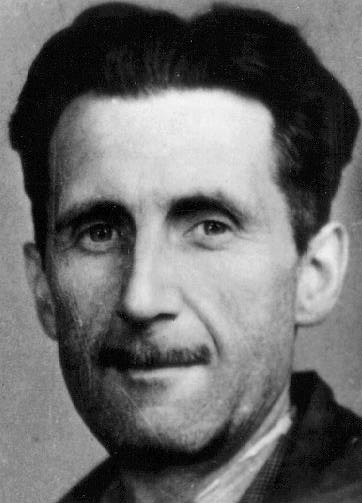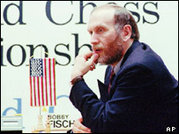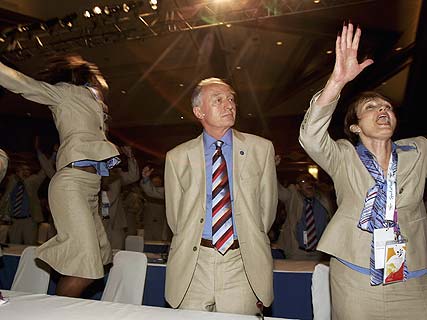Wargames

by Stephen Berry
In the autumn of 1945 the Russian soccer team Moscow Dynamos toured Britain on a mission of goodwill. It was felt that the comradely spirit which had developed between Britain and the Soviet Union during the Second World War ought to be reinforced.
Unfortunately, events did not quite turn out as planned. Many of the matches engendered such ill-feeling that George Orwell was prompted to write in an essay The Sporting Spirit , “Now that the brief visit of the Dynamo football team has come to an end it is possible to say publicly what many people were saying privately before the Dynamos ever arrived. That is, that sport is an unfailing source of ill-will, and that if such a visit as this had any effect at all on Anglo-Soviet relations, it could only be to make them slightly worse than before.”

George Orwell got sport and politics right
But many people can still be heard to proclaim with a bull-headed obstinacy that international sport should be encouraged as a source of goodwill between nations, a means by which individuals from different countries can come to know and like each other. Unfortunately, there are simply too many examples of international sport producing ill-will and all but sparking international incidents.
In 1933, the Australian government nearly broke off diplomatic relations with Great Britain because it felt that the English cricket team had used very ungentlemanly tactics in its matches with the Aussies. The 1936 Berlin Olympics have become famous for the popularisation of an ideology whose message has never been construed as goodwill to all.

The Berlin Olympics
More recent Olympic Games have been dogged by unpleasant and tragic incidents. At Munich 1972, Israeli athletes were killed after being kidnapped by Palestinians. Montreal 1976 saw a boycott by black African states, Moscow 1980 a boycott by the U.S.A, and Los Angeles 1984 suffered a boycott by the Soviet Union and its allies.
In recent times, pride of place for the sport that has done most to further international disharmony must be given to soccer. The populations of European cities quake with fear at the arrival of British spectators for European Cup matches. Even the deployment of hundreds of police officers is unable to prevent trouble. At the final of the European Cup in 1985, a riot of rival British and Italian fans resulted in dozens dead.
Matters are even worse in South America. Soccer spectators there are caged behind wire mesh fences to prevent them from rioting on to the playing fields. This is not always successful: at least one referee has been shot dead by a fan who disagreed with his decision. In 1994, a Columbian soccer player was murdered shortly after the World Cup because he had let in a goal by the opposition.
International sport bears a more than passing resemblance to war without weapons. The increased interest (and danger) in international sport in the 20 th century was closely linked to the rise of nationalism and an obsession with identifying with large governments.
Once a sports team is said to represent Great Britain or Argentina, or indeed any other nation state, a whole Pandora's box of disputes is ready to be opened. Before the 1968 Olympic Games, Hubert Humphrey stated that it was important for the U.S.A. to win more medals than the Soviet Union. It was doubtless true that the Soviets approached sporting contests in the same spirit.
If relations are poor between countries, sport should be discouraged at all costs. Only a bloodthirsty maniac would suggest holding a soccer match between Israelis and Palestinians before a mixed crowd of 50, 000 spectators to “improve Arab-Jewish understanding.”
Politicians are nothing loathe to manipulate sport for their own purposes. Once Soviet Bloc politicians had realised that sport, not religion, was the opium of the masses, no effort was spared in the search for medals and their sportsmen and women were accorded elite status. The West went the same way. In Britain, various groups waged campaigns to prevent sport with South Africa. Although Mrs Thatcher disapproved of these campaigns, she was one of the first to support President Carter's proposed boycott of the 1980 Olympic Games. In 1992, the former world chess champion, Bobby Fischer, was turned into a common criminal because he went to play chess in Yugoslavia, a country against which the U.S. government had decreed a trade boycott.

Bobby Fischer, hunted because he played chess.
The idea that Englishmen could play cricket against South Africans or that Americans could play ice hockey against Russians, without this passing any significant comment on their respective governments, has been almost completely forgotten. Laurence Sterne's Sentimental Journey , a novel that describes the author's trip across 18 th century France, takes place whilst that country was at war with Britain. Sterne did not seem to regard this as more than a minor irritant to a private citizen's travels. Clearly, governments of the present day demand more of their sports teams in peacetime than they once demanded of their citizens in wartime.
Here then is one Londoner whose heart sank when he heard that the Olympic Games would arrive in town, year 2012. To pay through the nose for this circus and then see London turned into a fortress was not something which he found immediately appealing. Many people will no doubt be surprised to learn that at the first Olympic Games, athletes competed for themselves, not as representatives of their countries. If there is any real wish to reform the Olympics, it will not be sufficient to move the location permanently to Greece, as has been suggested. More radical methods will have to be found if we want to take the nationalism out of the Games.

Tessa Jowell, British Minister of Culture and Citizen Ken celebrate the news that the Olympic games is coming to London town
Until such methods are implemented, we should treat those who advocate greater international understanding through sport with a healthy scepticism. Sport has rarely, if ever, played a part in lessening tensions between countries; rather it has increased them. To that extent, the propagation of sport as a political tool for improving goodwill between nations should be resisted whenever possible.
![]()
 Top 50 books of all time : by Old Hickory:-
Top 50 books of all time : by Old Hickory:-
"I have limited the selection to the books I have read. I keep to the norm of not recommending to others books I have yet to read. Clearly, books I have not read by now suggests a judgement of some sort."
PDF version
of this page
wargames.pdf
Download
Requires Adobe Acrobat Reader. This is available
for free at www.adobe.com
and on many free CDs.
|
|
|
|
